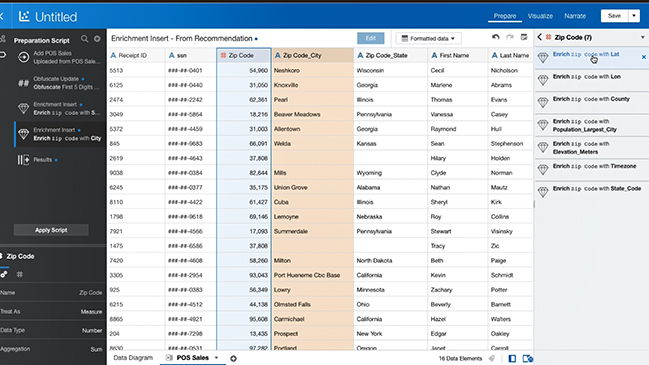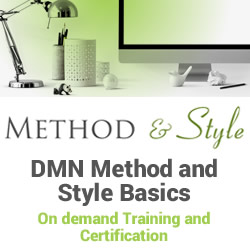Insight 20/20: How’s Your Vision?
Blog: Oracle BPM
By Bruno Aziza, Oracle Group Vice President, AI and Data Analytics Cloud
Oracle has been in the data business for close to 4 decades. In that time, our solutions have adapted to offer the secure and sophisticated capabilities you need to successfully manage the information you use to run your business—and to change it.
Today, all that data is part of every experience, whether you’re a consumer checking social media for great holiday gifts or a data scientist fine-tuning a model to predict and prevent fraud, and the myriad points between.
Analytics is the face of all that data, which is why companies are looking to make analytics truly pervasive across their organizations and to achieve the goal of 100% data literacy. At the same time, the analytics industry is maturing beyond self-service and moving into its augmented era, where machine learning and artificial intelligence (AI) offer the potential to deliver a level of access to data and insights that were unimaginable just a few years ago.
Data and Analytics: Core Beliefs
Oracle’s history and future are directly connected to the intersection of these trends, especially for the Oracle Analytics team, which believes:
1) Artificial intelligence will transform the analytics value chain by automating and accelerating the path to better insights.
2) New personal interfaces will break the barriers between people and data, enabling 100% data literacy and dramatically increasing the value from data.
3) Insights demand actions, and teams will move rapidly from working on better-looking dashboards to instrumenting intelligent business decision systems that drive action.
The AI Imperative
Eighty percent of employees’ time is spent finding and preparing data. Augmented Analytics makes it possible for platforms to automatically clean and enrich data, obfuscate sensitive information and, based on metadata, auto-generate dashboards for analysts to refine and customize, reducing human effort and supercharging productivity.
AI, machine learning, and natural language processing combine to make analytics accessible to everyone, which is why they have been infused throughout our entire suite for years—from data ingestion to data management to the automation of insights. For instance, Oracle Analytics can automatically protect your data when it’s ingested and can automatically generate dashboards. You can tune and adjust it, as well as provide your own input to help make the experience even more specific to your needs.
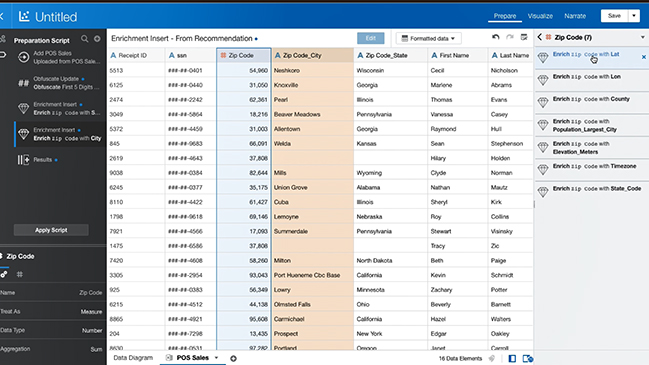
Your Data: This Time It’s Personal
Traditionally business intelligence and analytics were a specialized activity, separate from daily work. Business Analysts prepared, blended, and analyzed data in specialty tools and extracted insights into PowerPoint to be shared. The “Data to Insight” process was siloed. The ability to ask questions of the data was rigid enough that we called this problem the “Las Vegas” effect of data: “What happens in BI stays in BI.”
Now the understanding previously reserved for Analytics is required in every job, at every level. To make that possible, analytics must be integrated into everyday work experiences, including mobile devices, productivity and collaborative tools, and business tools. That’s why Oracle Analytics has a long history of offering people-oriented interfaces including voice, text, and mobile—in addition to traditional keyboards and pre-created dashboards. You can see that in our mobile app, which is the industry’s only voice-powered analytics assistant that uses AI to automatically generate contextual insights and proactively deliver them based on context, including location and time.
We can deliver such a leading mobile experience because of all the work we’ve done and continue to do with Natural Language Processing (NLP) and Natural Language Generation (NLG). Few players today match our breadth and reach when it comes to incorporating leading tech into the daily work of the people and teams who make up their organizations.
And even something as seemingly old-school as multilingual support has never been more relevant, because as the world’s population becomes data literate, people need to be able to speak to their data in their language. Part of our commitment to global data literacy is enabling analytics in 28 languages, and Oracle Analytics is notably the only solution in the market today with that level of language support. We’re years ahead of other solutions, and we will continue to continue out-innovate the market in this area.
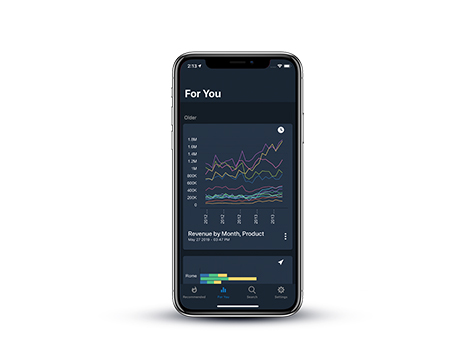
In Business, Actions Matter
Experienced business leaders know that action drives impact. And industry observers have witnessed that, while self-service analytics tools have provided broader data access, people still struggle to close the loop from insight to action.
Solving this problem means analytics needs to be open and integrated with all systems of record across all silos, organizational boundaries, and environments—whether on cloud or on premises. Analytics needs to foster collaboration, spanning every line of business and IT.
Our team has been working down that path for close to 14 years with a solution we call the Action Framework. This robust technology enables users to act on insights directly from their analytics. For example, an HR manager can identify underperforming employees in a performance dashboard and immediately enroll them in training courses—directly from the dashboard, without ever leaving it. Then to close the loop, he can share his findings with coworkers and collaborate on rolling training out more broadly by using the most convenient messaging platforms, because Oracle Analytics integrates seamlessly with Slack, Microsoft Teams, Messenger and others.
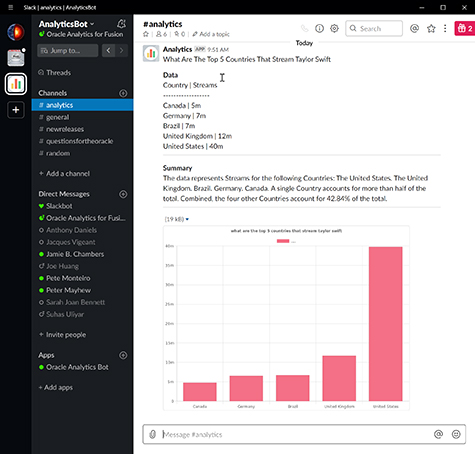
Cloud First
And of course, no view of the future of analytics is complete without the cloud, which fundamentally changes the nature of how companies and people interact with data. With a secure cloud, teams can easily provision, monitor and govern access to data. They can also leverage the cloud’s elastic model to run all types of analytical queries and models. And of course, the cloud makes it not only possible, but fast, secure and scalable for users to self-serve the capabilities they need while being model data stewards who practice ethical AI.
20/20 Vision: From Hindsight to Insight
This is now the end of 2019, a tremendous year for the Oracle Analytics community. We have always been committed to our partners and customers, but this is the year we changed our mindset to put the community at the center of everything we do, starting with:
- Simplified packaging and lower pricing
- New ways to connect with us, online through our collaborative roadmap, and in person at our first-ever Oracle Analytics Summit in June 2019
- Free Udemy courses that walk you through learning Augmented Analytics and Advanced Analytics
- Seeing your stories in the Oracle Analytics customer video series, Destination: Insight
- Regular updates via Partner Office Hours and partner advisory council meetings
No matter how much technology advances or markets change, our community will continue to be the driving force for our future direction and growth. In 2020 you will see more opportunities to connect and share your insights with the Oracle team, your colleagues and peers, and new members of the community. Look for us in new places online and in every region of the globe—the highlight of which is in April 2020 at our second Oracle Analytics Summit.
Leave a Comment
You must be logged in to post a comment.
